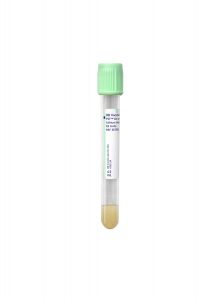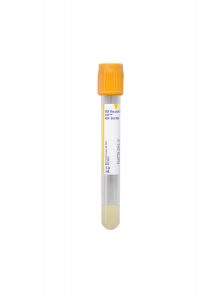Best Practice for Detecting Hyperhomocysteinemia: Homocysteine Testing—Not MTHFR Genotyping
There is no conclusive evidence supporting the clinical value of MTHFR polymorphism genotyping.
Practice guidelines from multiple professional societies agree that MTHFR polymorphism genotyping should not be ordered as part of clinical evaluation.
If there is a clinical concern regarding hyperhomocysteinemia, Cleveland Clinic Laboratories recommends Homocysteine testing (HOMCYS) in place of MTHFR genotyping. Homocysteine testing is less expensive, generates a result more quickly, and provides additional actionable information for patient management.
Upcoming Changes
Homocysteine (HOMCYS) Test Details
Test Name
Homocysteine
Test Code
CPT Code
83090
Performing Laboratory
Cleveland Clinic Laboratories
FDA Compliance
In Vitro Diagnostic (IVD)
Methodology
Enzymatic
Days Performed
Sun – Sat
Turnaround Time
8 hours
Specimen Requirements
Type:
Plasma
Volume:
1 mL
Specimen Container:
Light Green Lithium Heparin Plasma Separator Tube (PST)
Transport Temperature:
Refrigerated
Alternative Specimen Requirements
Type:
Serum
Volume:
1 mL
Specimen Container:
Gold Serum Separation Tube (SST)
Transport Temperature:
Refrigerated
Special Instructions
• Centrifuge and separate plasma/serum from cells less than one hour after collection.
• If collected in a non-gel separator tube, centrifuge and transfer plasma/serum to a CCL tube and refrigerate.
Stability
Ambient:
4 days
Refrigerated:
4 weeks
Frozen:
10 months
Reference Interval
18-99 Years – Normal:
<15.1 umol/L
Lack of Evidence for MTHFR Polymorphism Genotyping
Recommendation: Test Plasma Homocysteine Levels
There is no conclusive evidence supporting the clinical value of MTHFR polymorphism genotyping.
If there is a clinical concern regarding hyperhomocysteinemia, Cleveland Clinic Laboratories recommends Homocysteine (HOMCYS) testing.
• Multiple practice guidelines agree that MTHFR polymorphism genotyping should not be ordered as part of a clinical evaluation.
• A cheaper, faster, and more accurate way to test for hyperhomocysteinemia is to measure plasma homocysteine levels.
• If plasma homocysteine levels are high, patients can supplement with vitamins such as B6, B12, folate, and folic acid.
• If plasma homocysteine levels are normal, no treatment is indicated—even if there is an MTHFR variant.
Professional Societies with MTHFR Polymorphism Testing Guidelines:
After reviewing these guidelines,
Cleveland Clinic’s RT-PLMI Section of Molecular Pathology, Genomic Medicine Institute, and Laboratory Stewardship Committee agreed to discontinue MTHFR polymorphism genotyping.
Background
The MTHFR gene (OMIM: 607093) on 1p36.22 encodes the 5,10-methylenetetrahydrofolate reductase enzyme, which converts 5,10-methylenetetrahydrofolate to 5-methyltetrahydrofolate, the primary circulatory form of folate. This enzyme is also involved in the metabolism of the amino acid, homocysteine. A deficiency of the enzyme can lead to HHC.
Polymorphisms are common variants within a gene that do not necessarily affect its function, unlike pathogenic or disease-causing variants. Two commonly tested polymorphic variants in MTHFR are:
c.665C>T* (p.Ala222Val)
*Historically referred to as C677T, the ‘thermolabile’ variant
c.1286A>C (p.Glu429Ala)
These variants are so common that approximately 25% of individuals with Hispanic ancestry and 15% of North Americans with European ancestry have two copies of c.665C>T.
The presence of two copies of c.665C>T (homozygosity) may result in decreased MTHFR enzyme activity and mild HHC. Neither of these MTHFR polymorphisms causes severe MTHFR deficiency (<20% enzyme activity).
References
1. Lack of Evidence for MTHFR Polymorphism Testing. ACMG Practice Guideline. Genet Med. 2013;15(2):153-6.
2. Inherited Thrombophilias in Pregnancy. ACOG Practice Bulletin. No. 197. American College of Obstetricians and Gynecologists. Obstet Gynecol. 2018;132:e18–34.
3. Levin BL, Varga E. MTHFR: Addressing Genetic Counseling Dilemmas Using Evidence-Based Literature. J Genet Counsel. 2016;25:901-11.
4. Choosing Wisely® Initiative https://www.choosingwisely.org/
5. Eng, C. A Genetic Test You Don’t Need: Testing MTHFR is usually unnecessary. Cleveland Clinic Health Essentials. https://health.clevelandclinic.org/a-genetic-test-you-dont-need/. Accessed November 19, 2020.
Updating Best Practices
November 15, 2022: MTHFR genotyping will no longer be available as a send-out test, even if ordered as a miscellaneous test.
March 16, 2021: MTHFR genotyping will no longer be performed in-house at Cleveland Clinic.


